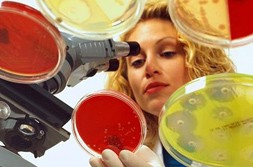STEM Career: Microbiologist

Have you ever wondered what’s going on in a world too small for our eyes to see? If so, microbiology may be for you.
Microbiologists study the world of bacteria and fungi. Often working in a laboratory and looking through a microscope, a microbiologist uses his or her knowledge of biology and chemistry to understand how these organisms function. Their research can have a broad impact on medicine and health policy, agriculture and even renewable energy. When working in a laboratory, they use the scientific method to plan experiments and test hypotheses.
A student interested in microbiology should take biology and chemistry courses in high school. In college, a bachelor’s degree in microbiology or biochemistry is the best path into this field. Statistics and other math courses will be helpful for understanding and analyzing data. Furthermore, experience in a lab with a professor is highly recommended. In most cases, a doctorate in microbiology is a necessary precursor to independent research.
According to the Bureau of Labor Statistics, the demand for microbiologists will increase by 13 percent from 2010 to 2020. Students interested in microbiology can look forward to a median salary of $65,920. Microbiologists can find work in the public sector, the private sector for health, energy and other companies, or colleges and universities.
